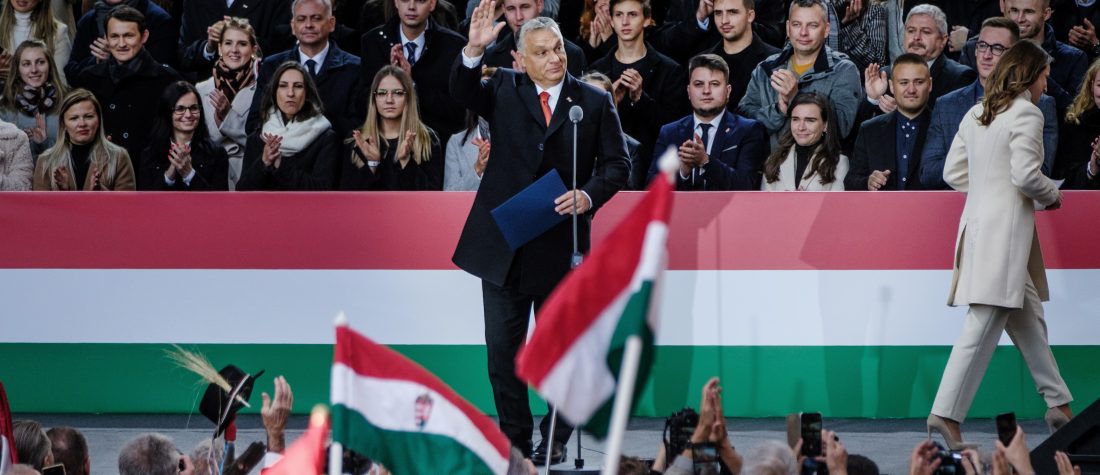When exactly are electoral observation missions warranted in a democracy? Hungarians are heading to the polls on 3 April to elect a new parliament and a substantial share of the opposition to Prime Minister Viktor Orbán seems to fear that the election will be neither free nor fair. Late last month, a coalition of MEPs from 19 different countries and five different political groups officially requested a team of election monitors from the Organization for Security and Co-operation in Europe (OSCE). The multilateral body quickly acquiesced. Their call for applications, should you fancy enlisting in their mission to monitor fraud and ensure equal access to balloting, is open until until the end of today (11 February).
Despite agreeing on little else, Dalibor Roháč and Boris Kálnoky both seemed confident that these legislative elections actually will be held in ‘acceptably’ fair terms. Ultimately, by throwing the election results into doubt, the opposition is making a larger point about the direction Hungary is headed in.
Orbán returned to office in 2010 after Hungary had experienced a decade of economic mismanagement under his party’s socialist rivals. According to his critics, he has been amassing power at the expense of democratic institutions, silencing critical media, lining the pockets of his Fidesz-affiliated cronies, and advancing an illiberal worldview that threatens Hungary’s good standing in the European Union (EU), as well as the rights of minorities at home. In EU-talk, the sum total of these concerns is often referred to by the phrase “democratic backsliding”, also used to label Hungary’s two closest allies, Poland and Slovenia.
But that is only one side of the story. For his supporters, the bad press Orbán gets in Brussels and other European capitals is part of a well-orchestrated, ideologically-fuelled campaign against any country or politician who dares oppose the EU’s liberal-federalist consensus. It is, this group cry, a witch hunt of sorts against right-wing wrongthink.
Regardless of the result on 3 April, one of the Orbán government’s more interesting legacies will doubtless have been the promotion of a conservative counterculture through institutions such as Mathias Corvinus Collegium (MCC), which it endowed with no less than €1.7 billion, and where Boris Kálnoky teaches journalism.
A slew of American right-wing stars including Rod Dreher, Sohrab Ahmari and Tucker Carlson has been making frequent visits to Budapest. A good example of the ideological culture war dividing Hungary’s society and colouring its perception abroad is a referendum on including LGBT content in school curricula, to be held the same day as the election. For Orbán’s camp, banning depictions of homosexuality from textbooks aimed at pre-pubic children is a matter of upholding decent mores, whilst his left-liberal opposition has lambasted what it deems to be a bigoted campaign to stigmatise homosexuality.
Given Hungary’s rather conservative electorate, relative to Western Europe, the opposition would be better advised to push aside the argument that such a law is a violation of the liberal orthodoxy and instead publicise the threat to the country’s access of vital EU funds. Though it has elsewhere pledged not to interfere in domestic matters, the European Court of Justice (ECJ) upheld, in a ruling issued last December, the legality of the so-called conditionality mechanism, a legal tool that has allowed the European Commission to pare back parts of Hungary’s allotted share of the EU’s Covid-19 recovery fund—around €7 billion—on the grounds that Orbán’s minimal progress combating corruption endangers “rule of law”. An even better trump card to play during the campaign would be pointing to Orbán’s foreign policy. A conservative himself, Roháč expressed concern that Orbán may be turning Hungary into a gateway into Central Europe for nefarious actors. Last summer, Hungary allowed Fudan University to open a campus in Budapest despite concerns that China uses these educational ventures for industrial espionage. Putin’s Russia has similarly found an ally in Hungary, a large buyer of its gas and the location of several Russian-operated nuclear power plants. For Kálnoky, lecturing Hungary on what its foreign policy should be betrays the same self-sufficient smugness that Western liberals adopt towards the country’s conservative mores, especially when bigger players in the EU such as Germany have also developed equally deep ties with both Russia and China over recent years.
These are merely a few glimpses into the kind of negative cases the opposition is likely to campaign on. But what do these groups stand for exactly? Well, it’s hard to tell. The spectrum of forces united behind Péter-Márki Zay, Orbán’s main challenger, ranges widely, from the right-wing Jobbik party to the liberal progressives of Momentum. Zay himself is a Catholic father of six and a former Fidesz voter who has been careful to keep the more radical elements of the opposition at arm’s length. Getting this fractious coalition to agree on a governing agenda is made even harder by Orbán’s main pitch to voters, namely, his claim to have secured widespread economic prosperity throughout his 12 years in office. Therefore, it is not entirely clear what kind of government Márki-Zay will form if elected. But if he wishes to oust a popular leader like Mr. Orbán, he will need more than finger-wagging accusations that he is a corrupt authoritarian. He will need a positive vision of Hungary’s future.
Jorge González-Gallarza (@JorgeGGallarza) and François Valentin (@Valen10Francois) are co-hosts of the Uncommon Decency podcast on Europe (@UnDecencyPod). Please consider supporting their show on Patreon: patreon.com/UnDecencyPod.


